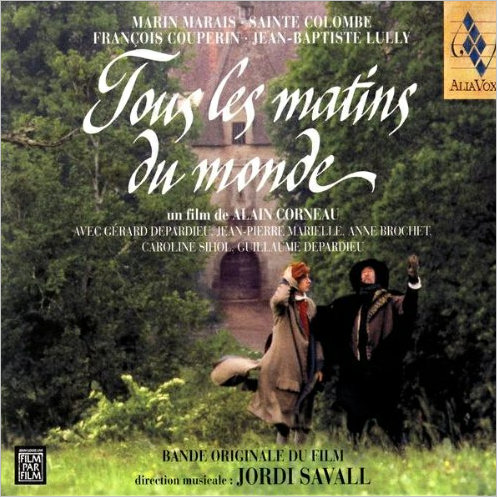Tous les Matins du Monde was the result of novel writer Pascal Quignard’s desire to bring to life a story about one of the greatest composers and perhaps performers of the the viola da gamba (“leg viol” in Italian, from the traditional position in which it is held), Monsieur de Sainte-Colombe, and his most famous student, Marin Marais. He partnered with writer-director Alain Corneau, who had been formally trained as a musician before switching interests to film-making in his youth. The writer built a fictitious novel around what little is known about “Jean” de Sainte-Colombe and later adapted it for the movie. The movie has a melancholic tone, suitable for what is known about the composer as a recluse, a trait that Quignard exploited to the point of romanticizing the legend to a believable but ultimately symbolic level as inspiration for the spirit of art.
There was a man who was perfect for the job, his name was Jordi Savall. This decision came as no surprise given that Quignard first found out about Sainte-Colombe from a recording Savall and Wieland Kuijken did of the French composer’s music in 1976 under the title Sieur De Sainte Colombe – Concerts A Deux Violes Esgales. Whether the consequent recordings by the duo of Sainte-Colombe’s music were at least in part due to the movie is unclear, but a second tome was released in 1992 followed by reissues of the older work several years later. Savall was already a well-known name in his world, but the movie boosted it to popular stardom as he became famous all over the world as a viol player and ensemble conductor.
The music in the soundtrack has a very private feel to it and stands in contrast with the contemporary religious music we know was for service. At the same time, it shares with it a quality of “introspection”. What this implies musically, exactly, is something that cannot be pinpointed easily and is probably a confluence of several different traits, similar to how the romantic “authentic” has been systematically analyzed by some in very interesting but abstract descriptions (for instance, simple, understandable melodies in the manner of folk music). The movie depicts a time of transition when a lot of the music that was being made by amateur nobility was increasingly being taken up by professional musicians playing in courts (this is, essentially, what separates Sainte-Colombe and Marais). Herein, the transcendental and the temporal and commonplace are juxtaposed.
This soundtrack consists most of pieces by Sainte-Colombe and Marais with a minimal addition of a few superb piece by other composers. Personally, I recommend “Le Bandinage” by Marin Marais and the excellent addition of a piece by an anonymous composer simply titled “Fantasie en mi mineur”.
https://www.youtube.com/watch?v=42rWaYp5Otk
5 CommentsTags: 1991, Alain Corneau, Baroque, Jordi Savall, marin marais, Monsieur de Sainte-Colombe, Pascal Quignard, rennaissance, Tous Les Matins Du Monde, viola da gamba, Wieland Kuijken


